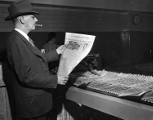Richmond Enquirer
Place of publication: Richmond, VA
Published in Richmond, Virginia, from 1804 to 1877, the Richmond Enquirer, known simply as the Enquirer until 1815, played an influential role in American politics, both in Virginia and beyond. Declaring "Verité sans peur," or "truth without fear," in its masthead, the Richmond Enquirer prided itself as an organ of Jeffersonian Republicanism, and later as a strong supporter of the Democratic Party.
Founded in 1804 by Thomas Ritchie, the Enquirer had evolved out of the Examiner, a prominent Democratic-Republican newspaper published in Richmond from 1798 to 1804. The Enquirer was published semiweekly--triweekly during sessions of the Virginia legislature--and cost four dollars per subscription. On May 9, 1804, after procuring from Philadelphia "an entire new set of printing materials, to the amount of 1000 dollars," as described in the Examiner, Ritchie, along with printer William W. Worsley, published the first issue of the Enquirer.
Ritchie's Democratic views played a central role in his editorial approach, and the Richmond Enquirer, like most other newspapers of its time, was largely defined by political polarity. By using his press as a political platform, Ritchie became a prominent and influential figure in Virginia politics, acting as a key member of the "Richmond Junto," a group of powerful Virginia Democratic-Republicans.
Lester J. Cappon, author of Virginia Newspapers 1821-1935, describe Ritchie as "one of the greatest editors of his day," served as editor of the Richmond Enquirer for over forty years. After dissolving his partnership with Worsley in July 1805, Ritchie partnered with Claiborne W. Gooch from March 1820 to November 1828 and with John L. Cook from November 1828 to August 1836. Finally, in 1843 he partnered with his sons, Thomas Ritchie Jr. and William F. Ritchie, before bequeathing the paper to them in 1845. Ritchie went on to edit the Semi-Weekly Union and the Daily Union in Washington, D.C.,from 1845 to 1851, at which point he retired.
Thomas Ritchie, Jr. remained with the Richmond Enquirer until 1854, while William F. Ritchie served as editor until 1860. In addition to the semiweekly, they began publishing the Daily Richmond Enquirer in 1844 and the Weekly Richmond Enquirer in 1855. After William F. Ritchie's retirement, the paper was run by a group of Richmond businessmen headed by O. Jennings Wise, Captain of the infantry regiment, the Richmond Blues, until his death in battle in 1862.
The Richmond Enquirer remained strongly Democratic during the Civil War, ardently supporting the Confederacy and Jefferson Davis's administration. War conditions brought hardship for the newspaper: from March 20, 1862 to April 1, 1865, it was only able to publish half-sheet issues. During the fall of Richmond, the Richmond Enquirer's office was destroyed, leading the paper to suspend publication on April 1, 1865.
The Richmond Enquirer resumed publication on October 30, 1865, absorbing the Richmond Sentinel and continued as the Richmond Enquirer until the semiweekly edition ceased publication in 1877, ending its 73-year run.


